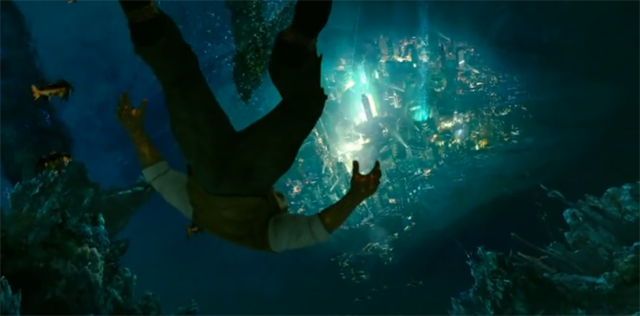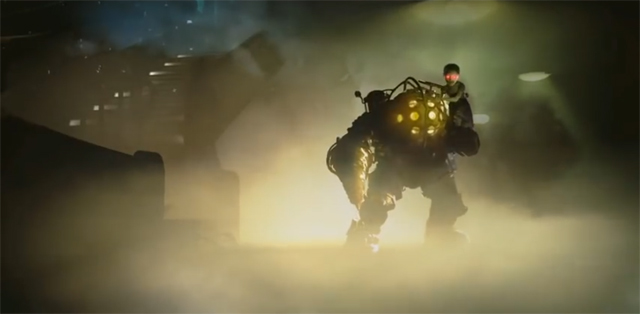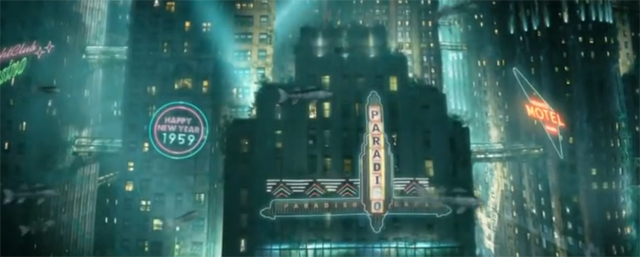Is BioShock Art?
A friend once convinced me to read Ayn Rand’s famous novel Atlas Shrugged. Since I have a degree in Literature, I’m not intimidated by gigantic books, so I took his bad advice and read through over 1,000 pages of Objectivist bullcrap.
It’s kind of a hard read to swallow, and it often feels like it was overly long just so it would take up more space on a bookshelf and intimidate the other books into submission. I typically don’t recommend actually reading the thing.
I’m glad I slogged through it, though, because it made BioShock a far more potent experience for me.
See, Atlas Shrugged sets up a world where the rich and prosperous get so tired of dealing with those obnoxious working class parasites that they create their own society in a secret valley somewhere (in Colorado, if I’m remembering the book correctly). In this utopia, they get to just be prosperous in an über-capitalistic society and be awesome at absolutely everything (even sex! Yay!) without being tied down by liberal legislation and all that other crap.
Sounds a bit like the mindset Rapture was founded on, doesn’t it? Well, that’s because BioShock‘s Rapture is based pretty heavily on the concepts found inside Atlas Shrugged. You’ll notice that Rapture’s founder, Andrew Ryan, has a name that’s just a few letters too long to be an anagram for Ayn Rand. You’ll also notice that one of BioShock‘s main characters goes by the name Atlas.
In fact, I would say that BioShock is almost a direct response to Atlas Shrugged, as it takes the exact same sort of utopian society of the novel and shows some of the ways that its own ideals would quickly devolve it into a true dystopia.
And then it adds the terrifying Big Daddies.
The horror of BioShock resonates so well because it’s not about some mysterious supernatural vagueness; it’s about actual human ideals and obsessions being taken to the extreme. It’s scary because it’s remotely plausible.
I grew up in a very Christian home, and, at an inappropriately young age, I was forced to watch this movie series that told of a terrifying Rapture scenario. (Imagine Left Behind reimagined as a horror story that took place in the 1970s, and this movie series was basically that.) Thinking back, that was probably my introduction to post-apocalyptic storytelling, and I was way too young to think about that concept without descending into a horrifying childish paranoia.
(It’s maybe also why I have such negative feelings toward the word “Rapture,” which Dictionary.com actually defines as “ecstatic joy or delight; joyful ecstasy.” For me, it means, “some really terrible shit that’s going to happen to you if you don’t believe in a particular ideology,” which actually makes it a pretty appropriate name for BioShock‘s underwater city.)
The thing that made the series terrify me so badly — if I’m remembering my childhood thought process correctly — was that a lot of the scariest parts (there was a guillotine scene that seems to stand out) were less about the crazy supernatural stuff that was going on and more about the way the government was handling the whole thing. People were publicly executed because they refused to be a part of that system, and all of this was allowed to happen by people who were merely “following the rules” of some extremist political ideology.
And maybe it was just because I was exposed to it at such a young age, but that felt real to me. It felt like a possible way for human beings to actually act, which made it far scarier than anything else I was allowed to watch as a kid. It was obsessive ideology that brought out the worst in mankind, and a large subsection of humanity was forced to endure terrible things as a result.
We can look back less than 100 years to see that human beings are actually capable of creating these sorts of dystopian societies, which makes it not entirely unreasonable to imagine it happening again in the near future if just a few of the right things happen.
BioShock sets up a similar sort of paranoid ideology, winds the crank, and lets it deteriorate into chaos. Then it tosses you into the resulting mess. You’re helpless in a strange place you don’t really understand, and all you really know for sure is that things went horribly wrong here. When you’re contacted by a fellow who seems to know what’s going on down here, you instantly trust him because you have no other option. Doubting him is abandoning the only human connection you have in this place, so you’re vulnerable to his whims. That, in and of itself, is kind of scary.
And that’s to say nothing of the game’s brilliant mid-game plot twist (one of the best we’ve seen in the video game medium), or how insanely cool the underwater, Art Deco city of Rapture was from a design standpoint.
Actually, let’s talk about that plot twist for a second: It’s a thing that could have only worked in a video game. It deals heavily with mind control, and if you don’t do the horrible things it asks you to do (SPOILER ALERT: you must beat Andrew Ryan to death with a golf club), you can’t progress the game. If you want to continue playing, you need to make the character do the thing he’s being brainwashed into doing.
Not only was this a fascinating concept in its own right, but it was a way to make an interesting commentary on video games as a medium: Even when you feel like you’re in control, you’re usually just following a scripted series of events written by someone else. And, while there are games that are bucking this trend (No Man’s Sky and Minecraft instantly come to mind), an overwhelming majority of story-heavy games follow this pattern. BioShock uses that exact pattern to point out that this pattern exists; it opens players’ eyes to the fact that they have far less control than it probably feels like they have. Players here take a proverbial red pill that forces them to permanently see the video game medium in a new context.
BioShock isn’t just a masterfully designed horror game (though it is that too); it’s a video game that comments on the medium without actually breaking the fourth wall. It uses gameplay to tell the player something about gameplay, which means this particular story wouldn’t work as effectively in any other medium.
I’ve said this before, but these are the types of stories that video games need to tell to cement the medium’s potential to be considered a legitimate art form. Yes, BioShock is art. Absolutely.




